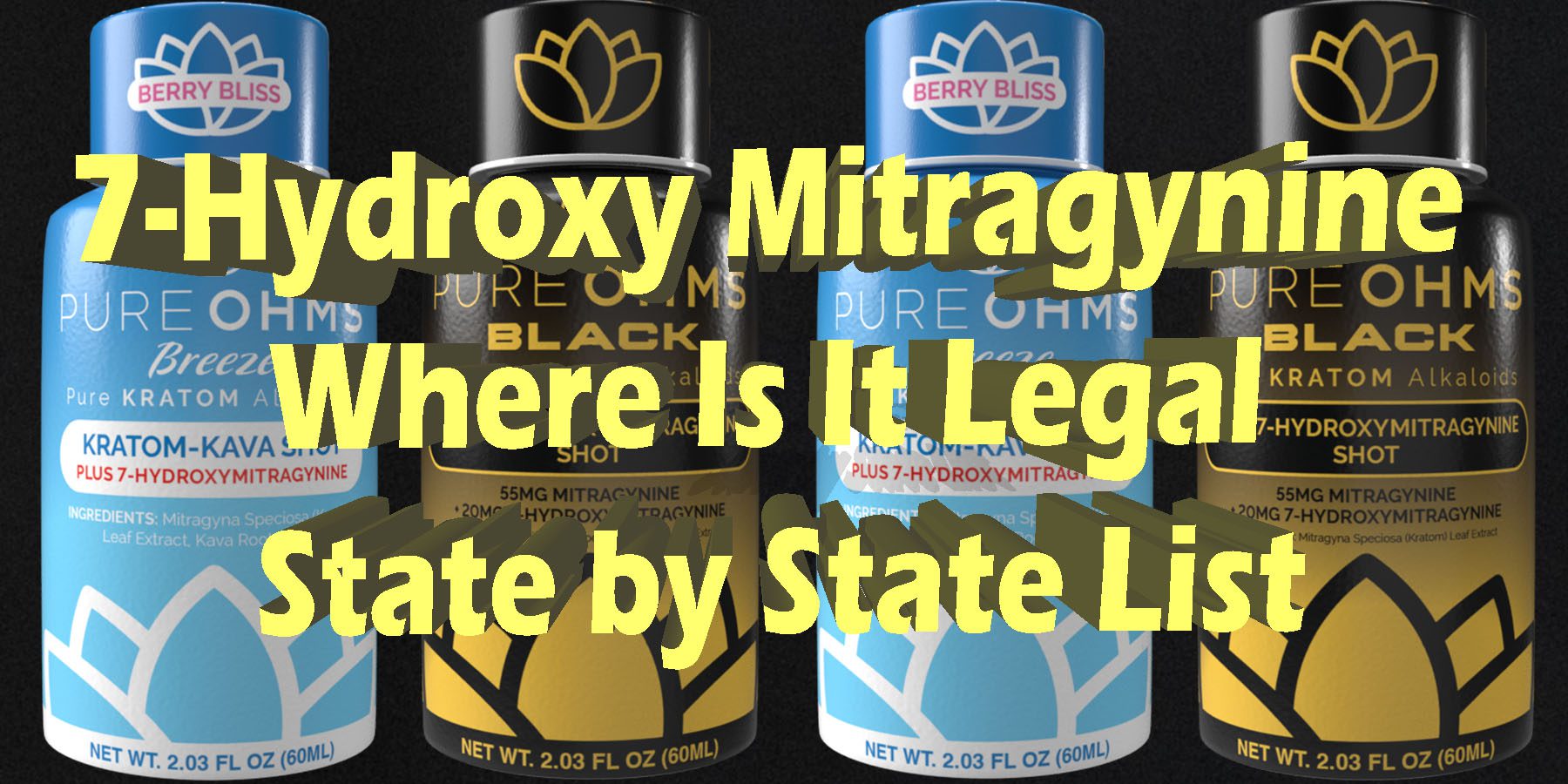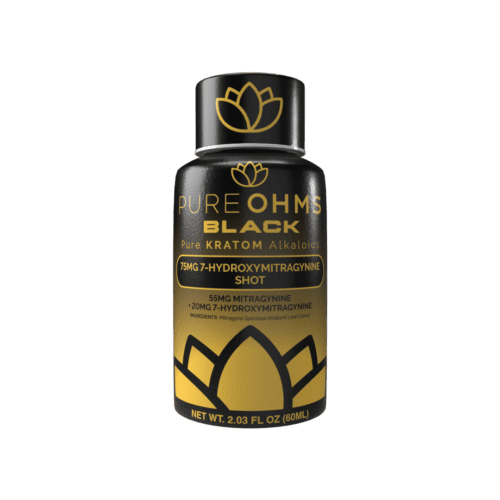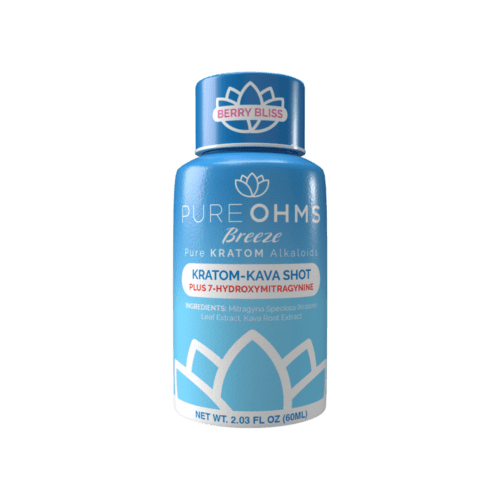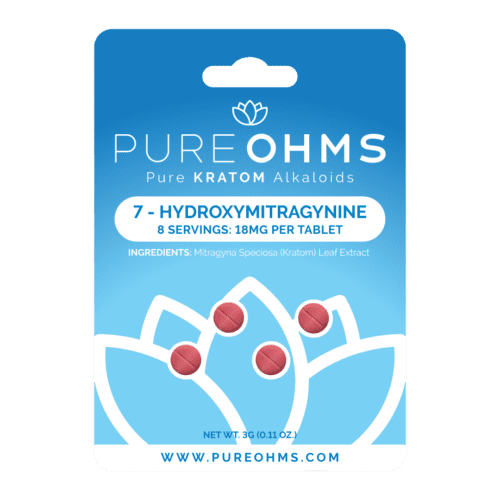
7-Hydroxymitragynine: Where Is It Legal? State by State List
7-hydroxy Mitragynine is one of the key alkaloids found in kratom leaves, though it is present in significantly smaller quantities compared to its more famous counterpart, Mitragynine. However, 7-hydroxy Mitragynine is considered much more potent, which contributes to both its appeal and its scrutiny. While traditional kratom use involves the whole leaf or its powder, 7-hydroxy Mitragynine is sometimes spotlighted due to its increased potency, which has raised both safety and legal concerns.
To buy 7-Hydroxy Mitragynine Click Here
Federal Legal Status of 7-Hydroxy Mitragynine
At the federal level, kratom, including its active alkaloids such as 7-hydroxy Mitragynine, is not currently listed as a controlled substance. The U.S. Drug Enforcement Administration (DEA) considered banning kratom and its alkaloids in 2016 but faced significant public and political pushback, resulting in the withdrawal of the proposal. However, the DEA continues to monitor kratom, and future regulatory changes are possible. Meanwhile, the legality of 7-hydroxy Mitragynine largely depends on state and local jurisdictions.
State-by-State Legal Status of 7-Hydroxy Mitragynine
The legal landscape for kratom and its alkaloids, including 7-hydroxy Mitragynine, is highly fragmented across the United States. Here is a detailed look at each state.
1. Alabama
- Status: Illegal
- Details: In Alabama, kratom and its alkaloids, including 7-hydroxy Mitragynine, are classified as Schedule I controlled substances, making possession, sale, or distribution illegal. This ban was enacted in 2016 due to concerns about the safety and abuse potential of kratom.
2. Alaska
- Status: Legal
- Details: Kratom, including 7-hydroxy Mitragynine, is legal in Alaska. There are no state-specific restrictions, although consumers should stay aware of any future changes.
3. Arizona
- Status: Legal
- Details: Arizona legalized kratom in 2019 under the Kratom Consumer Protection Act, which regulates the sale and labeling of kratom products, ensuring that 7-hydroxy Mitragynine remains available in a regulated manner.
4. Arkansas
- Status: Illegal
- Details: Since 2016, kratom and its alkaloids have been listed as Schedule I substances in Arkansas, prohibiting the sale, possession, and distribution of products containing 7-hydroxy Mitragynine.
5. California
- Status: Legal (except San Diego)
- Details: Kratom is legal throughout California except in San Diego, where a local ordinance bans it due to concerns over its potential health risks.
6. Colorado
- Status: Legal (except in certain cities and for human consumption in Denver)
- Details: While kratom is generally legal in Colorado, Denver prohibits its sale for human consumption, and some cities, like Parker and Monument, have local bans in place.
7. Connecticut
- Status: Legal
- Details: There are currently no state-wide regulations specifically banning kratom or 7-hydroxy Mitragynine in Connecticut.
8. Delaware
- Status: Legal
- Details: Kratom, including 7-hydroxy Mitragynine, remains legal in Delaware without any special restrictions.
9. Florida
- Status: Legal (except Sarasota County)
- Details: Kratom is legal in Florida, with the exception of Sarasota County, which has imposed a ban citing safety concerns.
10. Georgia
- Status: Legal
- Details: Kratom was legalized in Georgia in 2019 under the Kratom Consumer Protection Act, which includes regulations on labeling and sales to minors.
11. Hawaii
- Status: Legal
- Details: Currently, kratom and its alkaloids are legal in Hawaii, though legislative attempts to ban it have occurred in the past.
12. Idaho
- Status: Legal
- Details: Kratom, including 7-hydroxy Mitragynine, is legal in Idaho, with no state-specific restrictions currently in place.
13. Illinois
- Status: Legal (except Jerseyville and Edwardsville)
- Details: Kratom is legal in Illinois, but some local ordinances, like those in Jerseyville and Edwardsville, have imposed bans.
14. Indiana
- Status: Illegal
- Details: Indiana classifies kratom and its active alkaloids as Schedule I controlled substances, making 7-hydroxy Mitragynine illegal since 2014.
15. Iowa
- Status: Legal
- Details: There are no specific state laws banning kratom or 7-hydroxy Mitragynine in Iowa, allowing for legal possession and sale.
16. Kansas
- Status: Legal
- Details: Kratom is legal in Kansas without specific restrictions, though legislation attempts to regulate it have been considered.
-
Product on sale
 7-Ohms Hydroxy Shot – Black – Pure OHMS$15.99
7-Ohms Hydroxy Shot – Black – Pure OHMS$15.99$49.99
17. Kentucky
- Status: Legal
- Details: Kentucky has not imposed any bans on kratom or its alkaloids, though discussions around regulation have occurred.
18. Louisiana
- Status: Legal (potential future restrictions)
- Details: Kratom is currently legal in Louisiana, but there have been legislative efforts to ban or regulate its use.
19. Maine
- Status: Legal
- Details: Kratom and 7-hydroxy Mitragynine remain legal in Maine with no state-specific restrictions.
20. Maryland
- Status: Legal
- Details: There are no statewide bans on kratom or its alkaloids in Maryland, allowing 7-hydroxy Mitragynine to be legally purchased and used.
21. Massachusetts
- Status: Legal
- Details: Kratom is legal in Massachusetts without any special restrictions or bans.
22. Michigan
- Status: Legal
- Details: Kratom, including 7-hydroxy Mitragynine, is currently legal in Michigan, with regulatory discussions ongoing.
23. Minnesota
- Status: Legal
- Details: Minnesota does not have any state-specific restrictions on kratom, making it legal to buy, sell, and use.
24. Mississippi
- Status: Illegal in certain counties and cities
- Details: Kratom is banned in several counties and cities in Mississippi, including Union County and the city of Columbus, due to local ordinances.
25. Missouri
- Status: Legal
- Details: Kratom remains legal in Missouri, although there have been discussions about future regulation.
26. Montana
- Status: Legal
- Details: Kratom is legal in Montana with no current restrictions or bans in place.
27. Nebraska
- Status: Legal
- Details: Kratom, including 7-hydroxy Mitragynine, is legal in Nebraska without any state-specific regulations.
28. Nevada
- Status: Legal
- Details: Nevada passed the Kratom Consumer Protection Act in 2019, regulating the sale and ensuring the legality of kratom and its alkaloids.
29. New Hampshire
- Status: Legal (except for those under 18)
- Details: Kratom is legal in New Hampshire but restricted for minors under the age of 18.
30. New Jersey
- Status: Legal
- Details: There are no specific bans on kratom or its alkaloids in New Jersey, making it legal for purchase and use.
31. New Mexico
- Status: Legal
- Details: Kratom remains legal in New Mexico, with no state-wide restrictions currently enacted.
32. New York
- Status: Legal
- Details: New York has not imposed any bans on kratom, although regulation discussions have been ongoing.
33. North Carolina
- Status: Legal (restricted for those under 18)
- Details: Kratom is legal in North Carolina but restricted for sale to minors under the age of 18.
34. North Dakota
- Status: Legal
- Details: Kratom is legal in North Dakota with no state-specific restrictions on its sale or use.
35. Ohio
- Status: Legal
- Details: Ohio considered banning kratom in the past but has instead moved towards regulation rather than prohibition.
36. Oklahoma
- Status: Legal
- Details: Kratom is legal in Oklahoma, with no current bans or significant restrictions.
37. Oregon
- Status: Legal
- Details: Kratom remains legal in Oregon, though future regulatory actions are possible due to ongoing discussions.
38. Pennsylvania
- Status: Legal
- Details: Pennsylvania has not imposed any bans on kratom, allowing 7-hydroxy Mitragynine to be used legally.
39. Rhode Island
- Status: Illegal
- Details: Rhode Island classifies kratom and its active alkaloids as controlled substances, making them illegal to buy, sell, or possess.
40. South Carolina
- Status: Legal
- Details: There are no statewide bans or restrictions on kratom in South Carolina, allowing it to be legally used.
41. South Dakota
- Status: Legal
- Details: Kratom, including 7-hydroxy Mitragynine, is legal in South Dakota without any state-specific restrictions.
42. Tennessee
- Status: Legal (regulated for adults only)
- Details: Tennessee allows kratom but restricts its sale to those over 21, regulating it similarly to tobacco products.
43. Texas
- Status: Legal
- Details: Kratom remains legal in Texas with no current bans or significant regulations on its use or sale.
44. Utah
- Status: Legal
- Details: Utah legalized kratom in 2019 under the Kratom Consumer Protection Act, which ensures safe labeling and sale.
45. Vermont
- Status: Illegal
- Details: Vermont bans kratom and its alkaloids, classifying 7-hydroxy Mitragynine as a controlled substance.
46. Virginia
- Status: Legal
- Details: Kratom is currently legal in Virginia, with ongoing discussions about potential regulation rather than outright bans.
47. Washington
- Status: Legal
- Details: Kratom, including 7-hydroxy Mitragynine, is legal in Washington with no state-specific restrictions.
48. West Virginia
- Status: Legal
- Details: Kratom is legal in West Virginia, with no significant state-level restrictions currently imposed.
49. Wisconsin
- Status: Illegal
- Details: Wisconsin has classified kratom and its active alkaloids as Schedule I controlled substances, making them illegal.
50. Wyoming
- Status: Legal
- Details: Kratom remains legal in Wyoming without any current state-wide bans or significant restrictions.
The legality of 7-hydroxy Mitragynine in the United States is a patchwork of state and local regulations that reflect the ongoing debate about kratom’s safety, potential benefits, and risks. While federal regulation has so far not classified kratom or its alkaloids as controlled substances, individual states have taken varied approaches, ranging from full legality to complete bans. As discussions continue, it’s important for users, vendors, and advocates to stay informed about current laws and potential changes in their states.
Overall, 7-Hydroxymitragynine, a key alkaloid in kratom, is illegal in several U.S. states and counties. In the states of Alabama, Arkansas, Indiana, Rhode Island, Vermont, and Wisconsin, it is classified as a controlled substance and banned. Additionally, certain counties and cities have enacted local bans. These include Alcorn, Itawamba, Lowndes, Monroe, Tishomingo, and Union counties in Mississippi, as well as Franklin in New Hampshire, Parker and Monument towns in Colorado, and the city of Denver where kratom is banned for human consumption. In California, kratom is illegal in San Diego and Oceanside, and in Florida, it is banned in Sarasota County.



